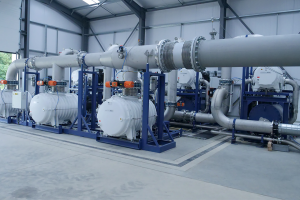The centre is designed to allow companies and universities to test state-of-the-art propulsion engines which are used to move small satellites in space.
It could also allow new types of more sustainable propellants to be tested, such as Hydrogen Peroxide and Liquid Oxygen, which are more environmentally friendly in sourcing, storage and combustion than the hydrazine currently used by thrusters.
The NSPTF has received £4 million in funding from the UK Space Agency, is described as the only facility of its kind in the UK and is expected to create around 60 jobs.
ESA’s General Support Technology Programme has also invested around €4,500 000 in the design, development and building of the facility.
Testing
For engine testing, the engines will be fired up in a vacuum, with a mechanical pump system generating a vacuum down to 1.5 milliBar in a test cell containing the engine; an equivalent test altitude of approximately 140,000ft, which ensures technology can be deemed ready for the space environment.
When firing, the pressure of the engine’s exhaust plume is partially recovered by a 7-metre-long supersonic diffuser.
Part of the new National Space Propulsion Test Facility is pictured above.
The UK government believes the satellite propulsion field is set to grow substantially in the coming years.
“As we build back better we are investing in our brightest space scientists, the facilities they work in and the technologies they are creating,” said Science Minister Amanda Solloway.
“This pioneering facility will support our ambitious space businesses, enabling them to undertake complex spacecraft engine testing, while boosting the local economy by creating highly skilled jobs.”
Nammo Space is the company that will operate the equipment.
“Thanks to this key UK government investment, UK space can now compete favourably with the very best rocket test facilities in the world,” said Rob Selby of Nammo Space.
“The Nammo team have designed, created and produced this phenomenal, state-of-the-art hot-fire test facility that is already driving further growth in UK based spacecraft propulsion businesses. We look forward to testing engines for customers from all over the globe and to further key developments that the NSPTF will enable.”
Space Propulsion
It was first announced that the Westcott Space Cluster in the Aylesbury Vale Enterprise Zone was to get a satellite propulsion test facility in December 2020.
The new centre is intended to enable companies and academics to test space propulsion engines at up to 1.5kN in high-altitude vacuum, an equivalent test altitude of 140,000ft, said the government.
See also: Westcott Space Cluster to support satellite propulsion testing
 Electronics Weekly Electronics Design & Components Tech News
Electronics Weekly Electronics Design & Components Tech News




